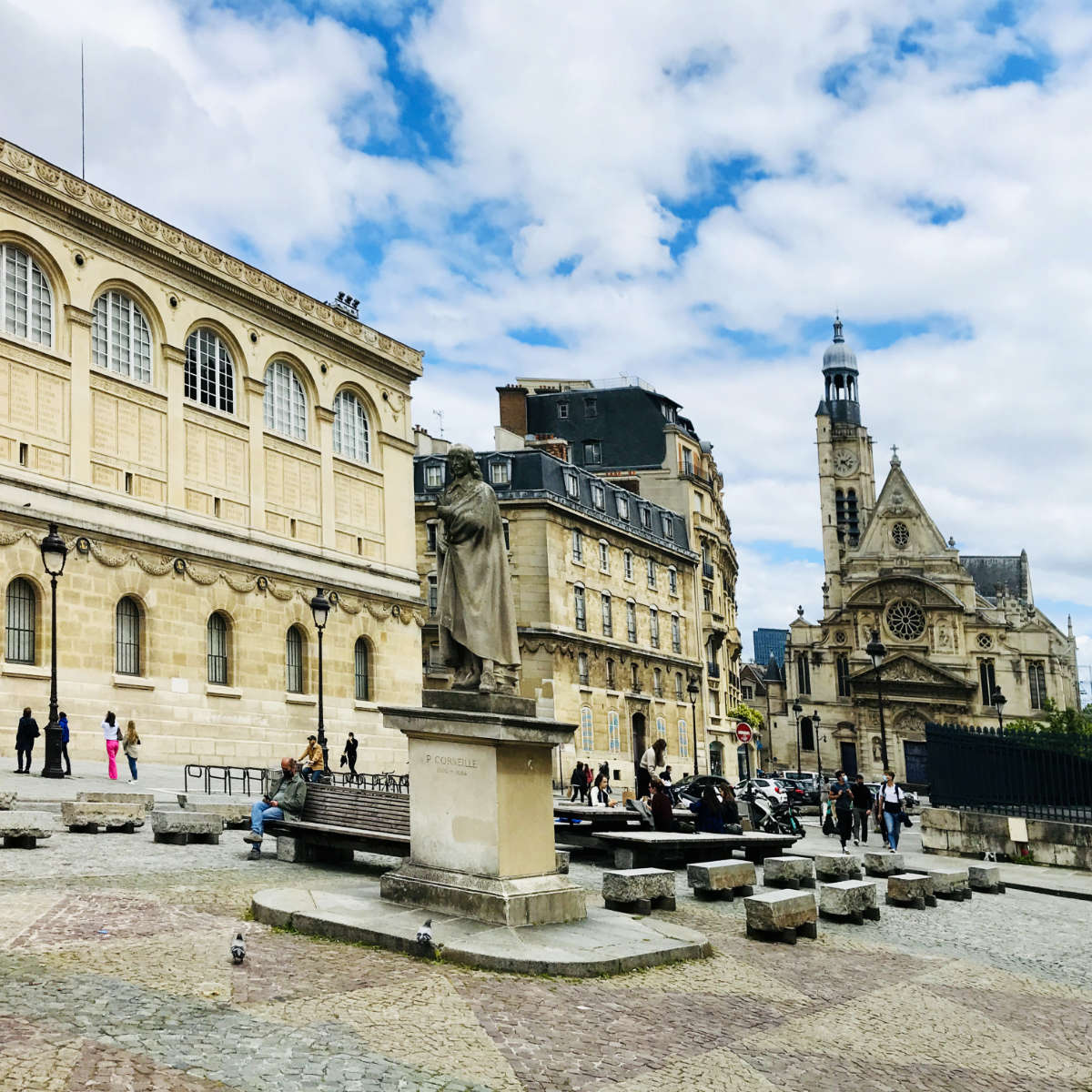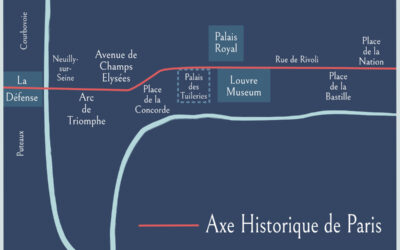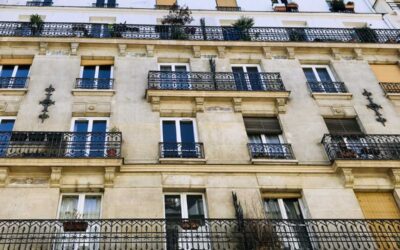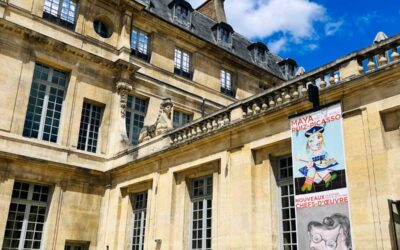The historic 5eme arrondissement in Paris has long been one of the most beautiful and popular neighborhoods in Paris. With its ancient roman ruins in the heart of the Left Bank, bustling streets, and trendy restaurants, it is the one that has always attracted the locals as well as visitors.
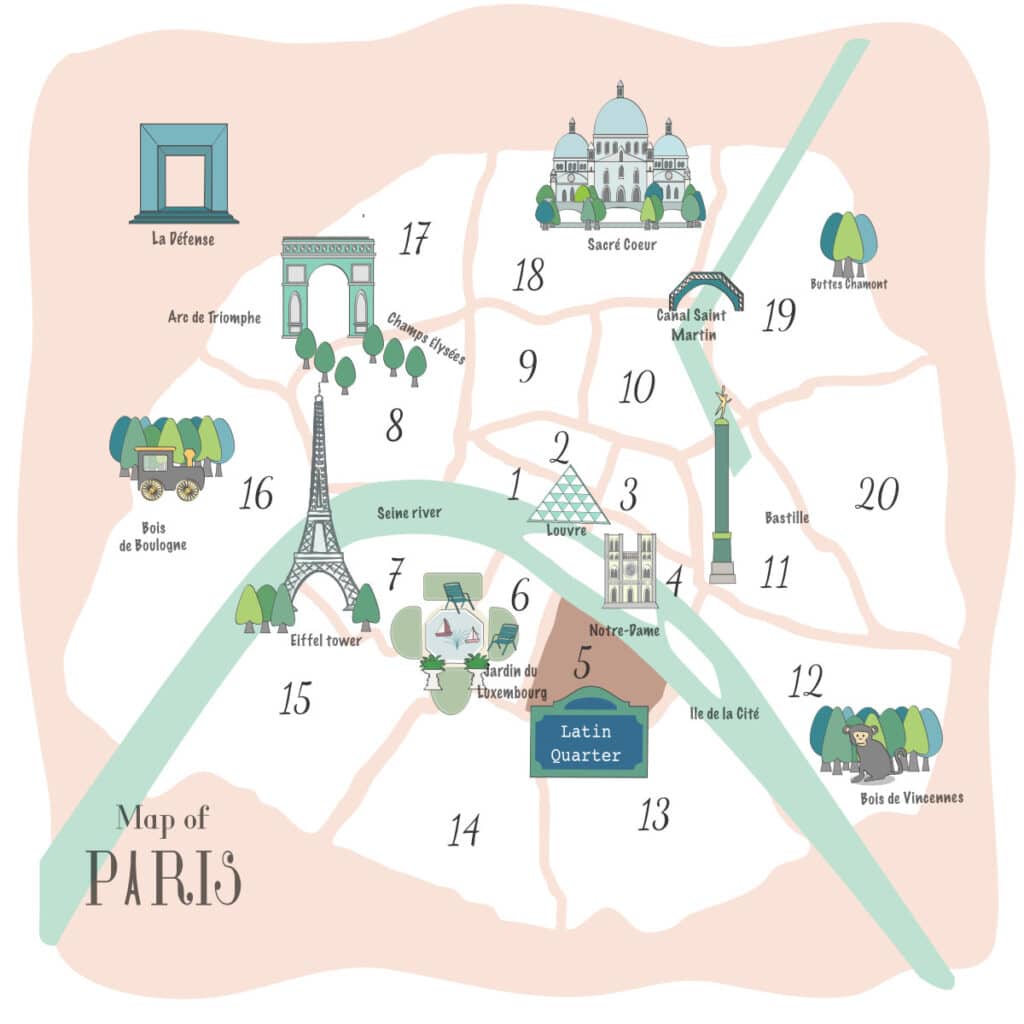
From the Pantheon to the Jardin des Plantes, there are quite a few hidden and not-so-hidden gems in this area to go exploring. So let’s see what there is to do in the 5th arrondissement, shall we? Allons-y!
What to see: Top Attractions
1. Latin Quarter
The 5th arrondissement is nicknamed the Latin Quarter for the university La Sorbonne that used to teach in Latin, this is one of the oldest parts of Paris.
The Romans used to hang out here, and the area has only developed since then. They changed the name of Paris to Lutetia (it used to be called Parisii after the local Celtic tribes) and built a city on banks of the river Seine in what is today Ile de la Cité, expanding into the Latin Quarter.
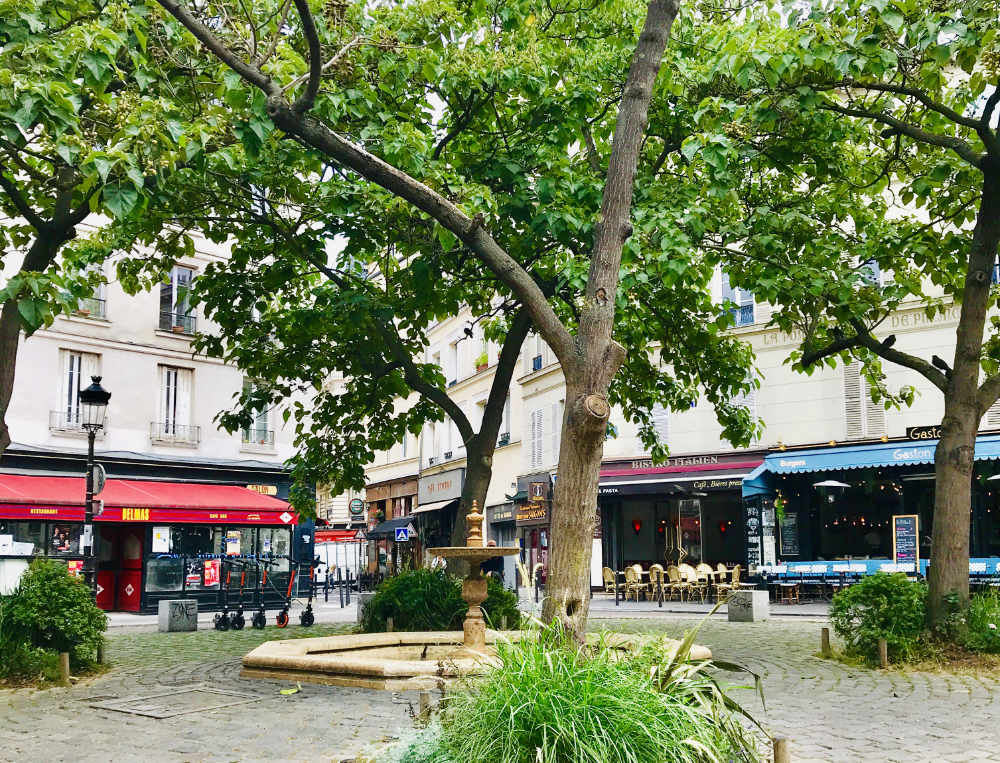
Today, it is still a student area, with many student bars and restaurants. Don’t be fooled though, the area is quite familial with many bourgeois Parisians also making their home here.
2. Pantheon
Originally intended to be a church, the Pantheon is where France’s national heroes and legendary figures are buried.
Like its much older counterpart in Rome, Italy, it celebrates famous French names like Victor Hugo, and Marie Curie, becoming a mausoleum and a monument to much of French history and culture.
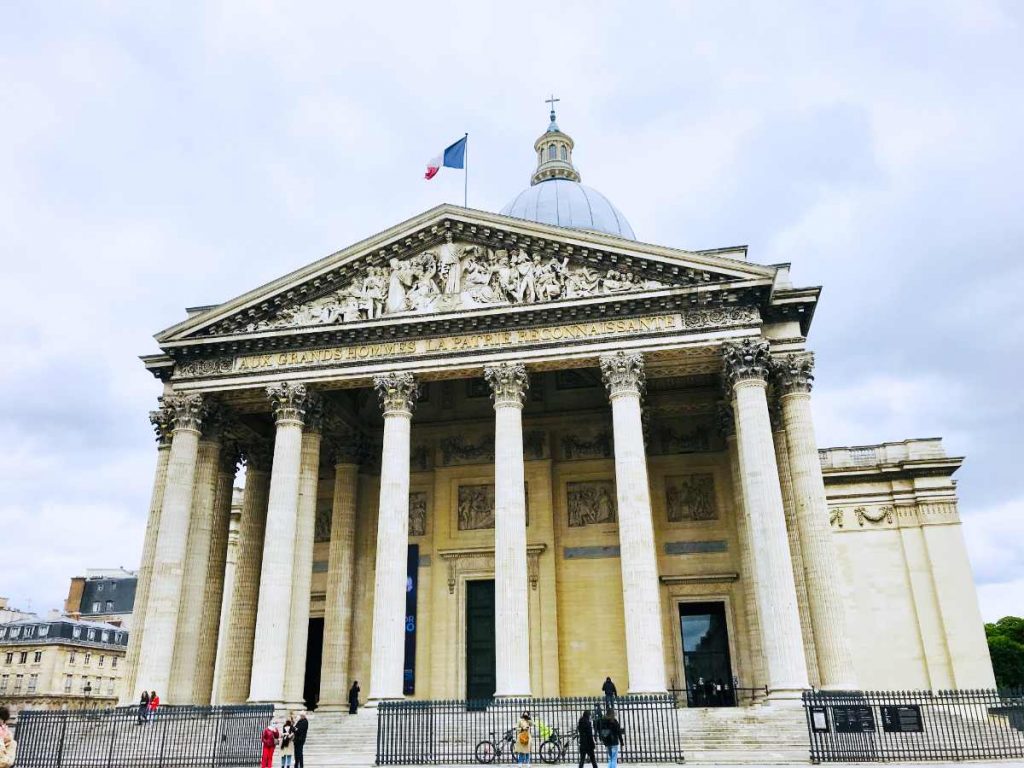
Inside are several statues, paintings, and symbols dedicated to French ideals of the République. Right in the center of the Panthéon is French physicist Léon Foucault’s pendulum, demonstrating the rotation of the Earth.
In addition, several people like Voltaire, Emile Zola and Jean Jaures are buried at the Panthéon. It is open everyday to visitors, and you can purchase your skip-the-line tickets here.
3. Saint-Étienne-du-Mont church
The Panthéon in Paris was originally intended to be a temple dedicated to Saint Genevieve who lived in the 5th century, at the time of the Roman Empire. The Roman empire was gradually decreasing in influence due to the increasing Frankish invasions (a Germanic tribe).
Genevieve was an ordinary woman from Nanterre who saw God and became a nun at 15. She would slowly become renowned for her piety and her visions, and become the patron saint of Paris.
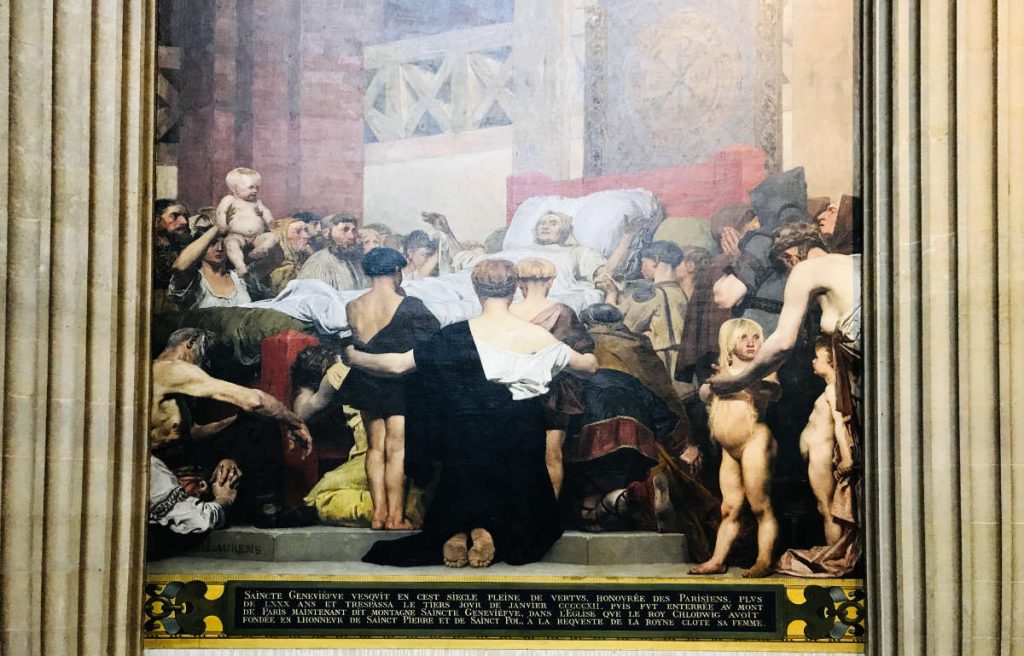
In 451 AD, Paris was threatened by the army of Attila the Hun, which had pillaged Treves, Metz and Reims. Parisians were planning to abandon the city, but they were persuaded to resist by Geneviève who led a prayer-marathon to divert the Hun army.
While the Pantheon ended up being converted into a tribute for the great thinkers, visionaries, and writers of France, the Saint-Étienne-du-Mont church remains dedicated to her, next to the Pantheon.
The church in Paris contains fragments of her tomb, as well as the tombs of inventor Blaise Pascal and revolutionary Jean-Paul Marat amongst others.
4. Jardin des Plantes
Right in the heart of Paris in the 5th arrondissement is a large botanical garden, which also features 4 large galleries holding specimens of all types of animals.
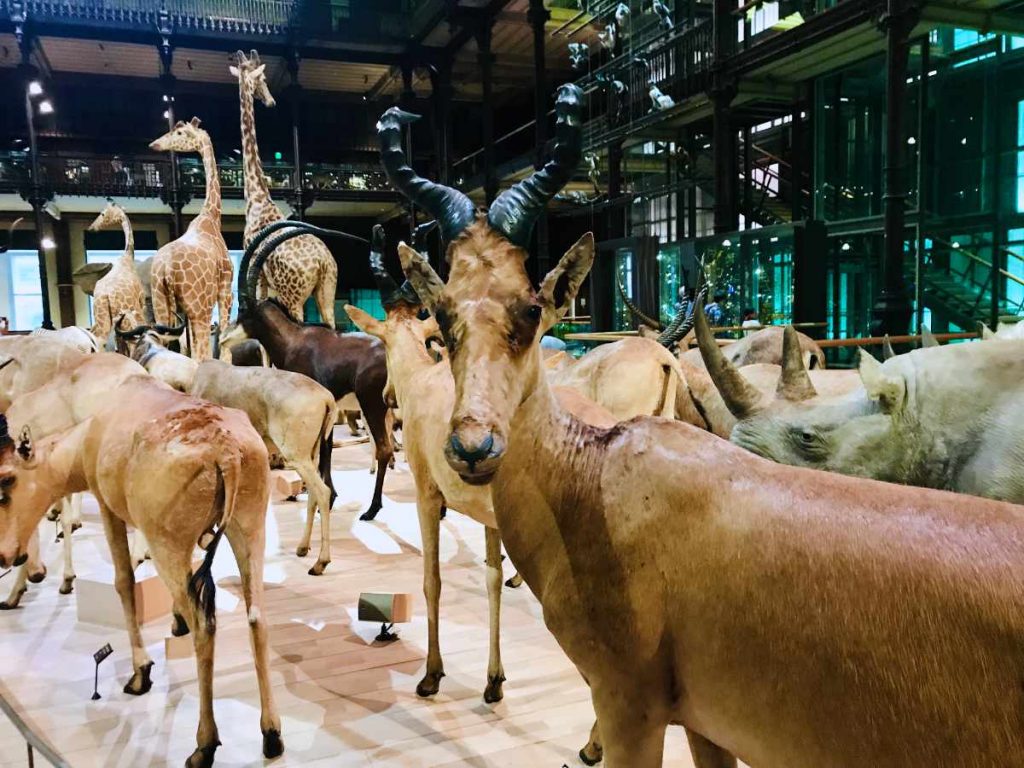
With everything from large dinosaur bones to whale skeletons and stuffed lions, there is plenty to see for kids and adults alike.
The 4 galleries include:
- Grande galerie de l’Évolution (‘Gallery of Evolution’) which includes over 1000 species of animals big and small.
- Galerie de Paléontologie et d’Anatomie comparée (‘Gallery of Paleontology and Comparative Anatomy’) displaying over 650 dinosaur remains.
- Galerie de Minéralogie et de Géologie (‘Gallery of Mineralogy and Geology’) displaying minerals, crystals and other rock formations.
- Galerie de Botanique (‘Gallery of Botany’) with a collection of almost 8 million samples of plants.
You can read more about visiting Jardin des Plantes here. Tickets to each galerie are sold separately, so book them all in advance.
5. Arenes de Lutèce
If you wander around the 5th arrondissement and Ile de la Cité within Paris, you can still see the ancient city walls and the Arènes de Lutèce.
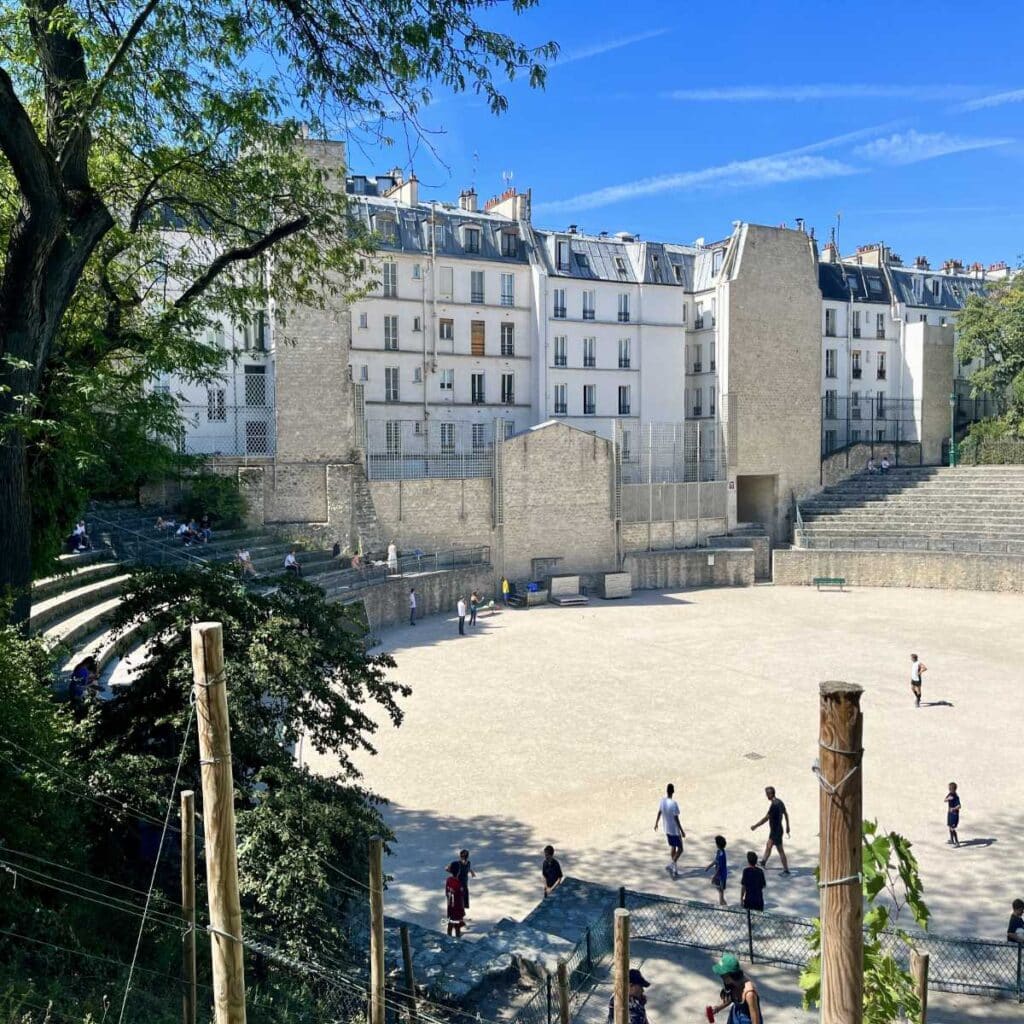
There are among the most important ancient Roman remains from the era in Paris. The small arena can be accessed from 49 Rue Monge, 75005 Paris and entry inside is free.
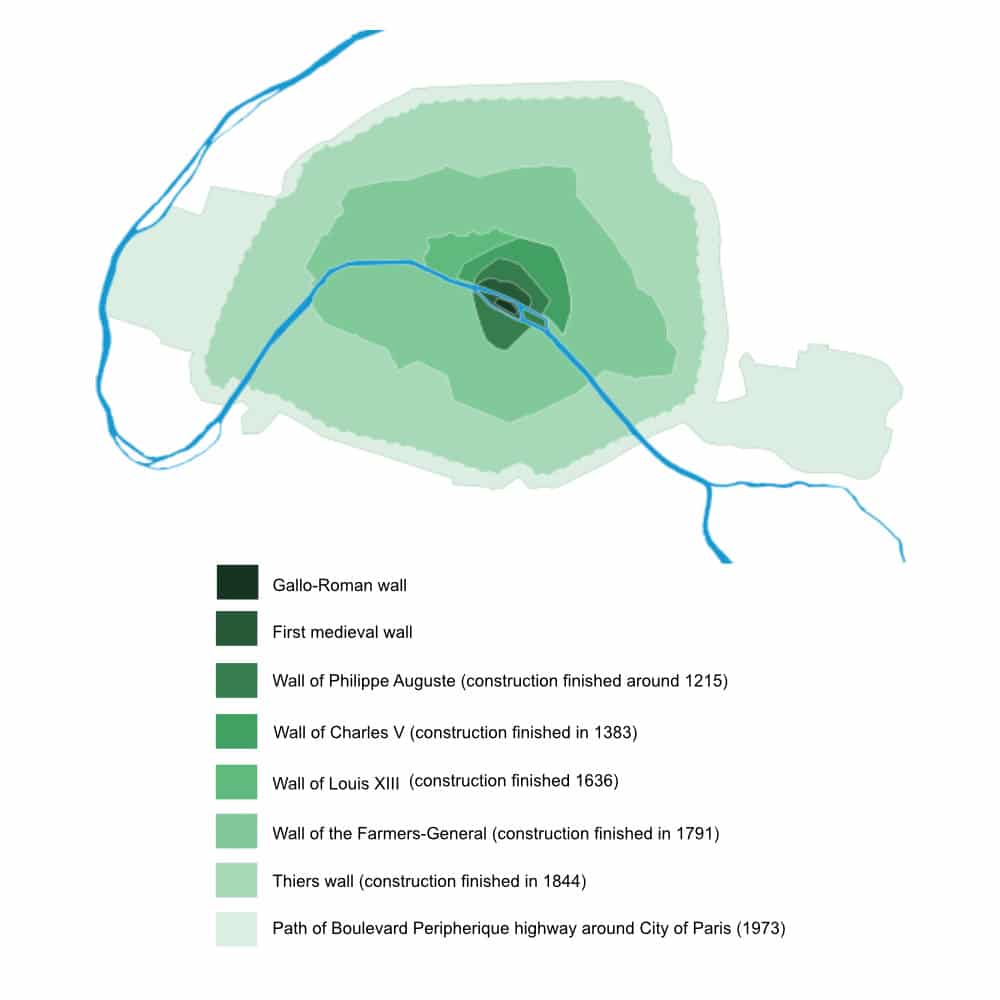
6. Musée de Cluny
Musée de Cluny is an abbey that was partially constructed on the remnants of the third century Gallo-Roman baths known as the Thermes de Cluny, Roman era.
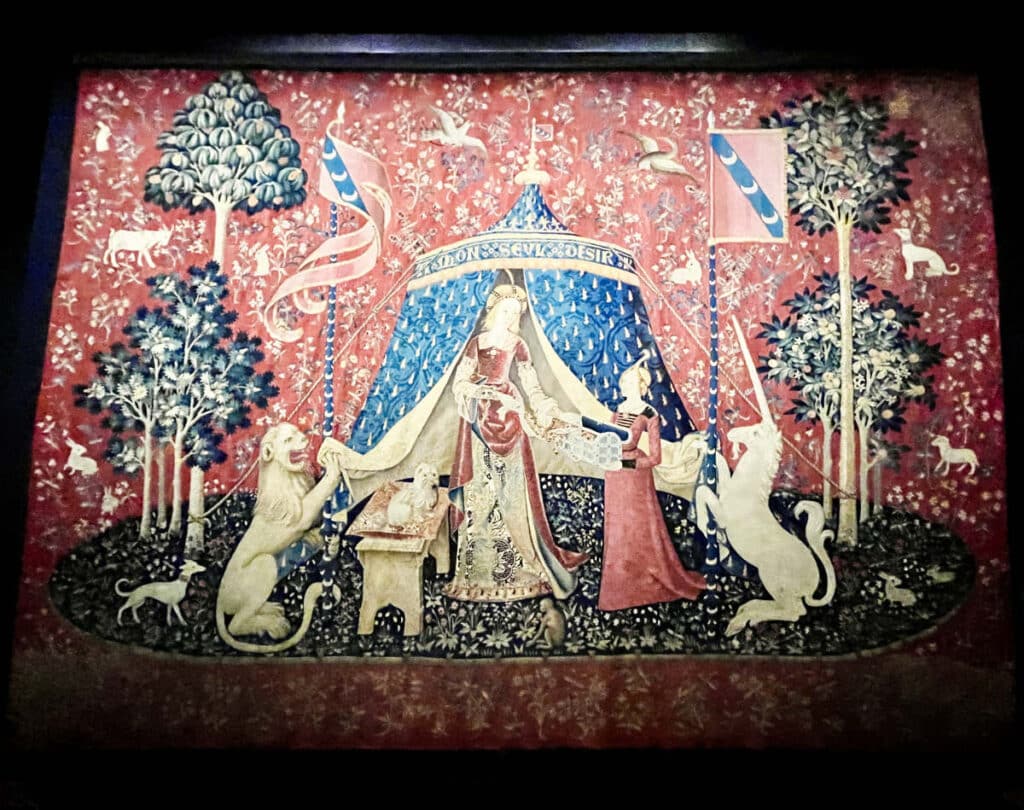
Today the museum houses an extensive collection of medieval art in a 15th-century abbey. One of the most well-known of its displays are the six tapestries of The Lady and the Unicorn (La Dame à la licorne).
It also holds the original statues of Kings that were on the front of Notre Dame de Paris, before they were cut down during the French Revolution. You can buy tickets for the museum here.
7. Shakespeare & Co’s
The world famous Shakespeare & Co’s bookstore near the banks of the Seine river is located in the 5th arrondissement. Founded in 1951, the shop was named after an earlier bookstore owned by American author Sylvia Beach that she founded in 1919 at a nearby location.
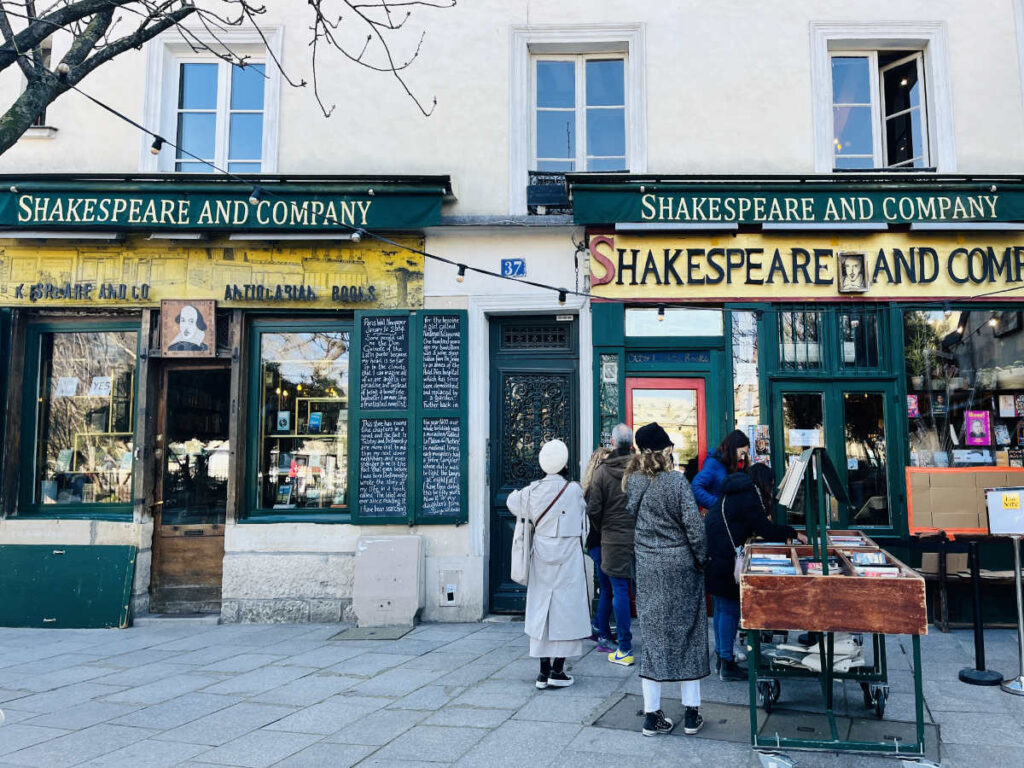
The shop is renowned for its classic new and used books in English and other languages, making a treasure trove for booklovers. The shop is open everyday and located at 37 Rue de la Bûcherie, 75005 Paris.
8. Musée Curie
Marie Sklodowska moved to Paris as a young woman, which is where she met her husband, a French physicist and inventor named Pierre Curie. Together, they would identify radioactive isotopes develop the theory of “radioactivity” and share the 1903 Nobel Prize in Physics.
Marie Curie would go on to also win the 1911 Nobel Prize in Chemistry, after the death of her husband, making her the first person to win in two different fields.
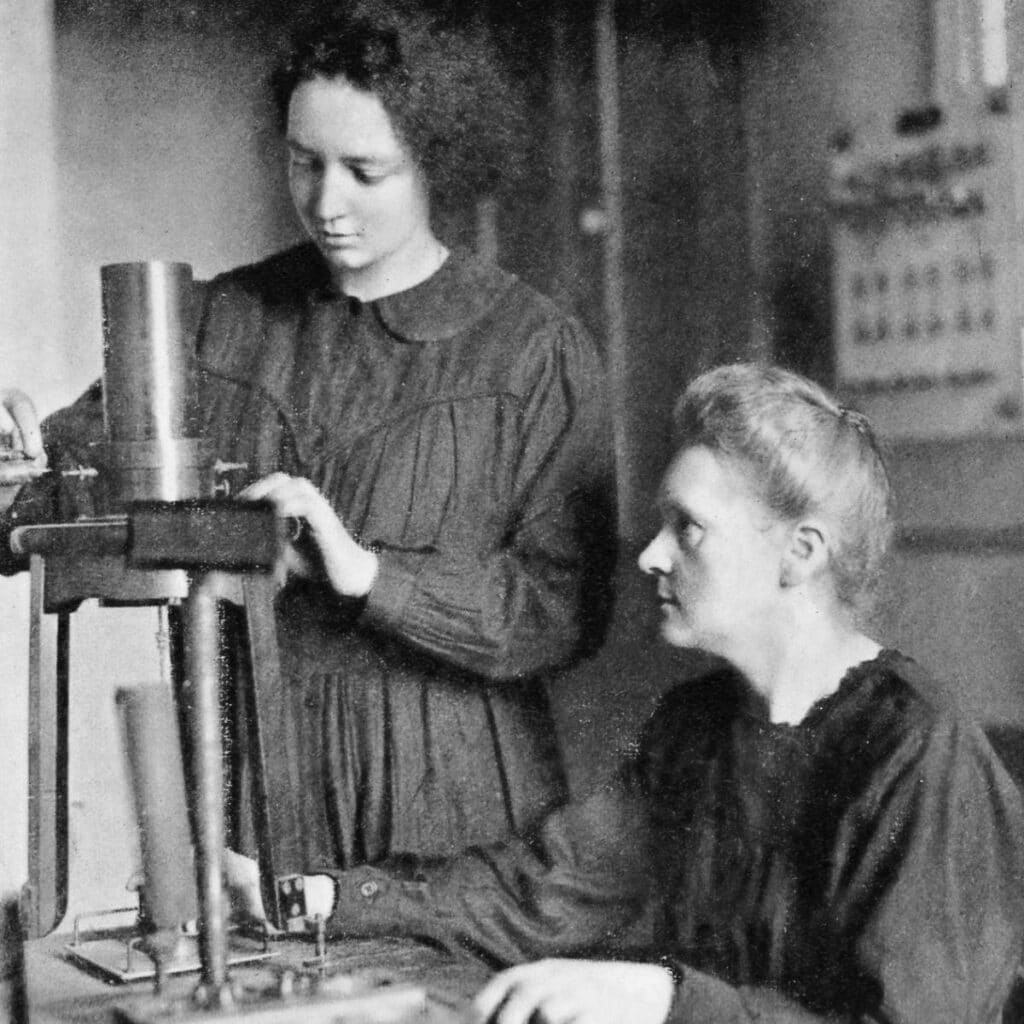
Their daughter, Irène Joliot-Curie, also won the Nobel prize for chemistry in 1935 together with her own husband Frédéric Joliot-Curie.
Marie Curie’s former laboratory has been transformed into a museum by their other daughter Eve Curie (a writer) at 1 Rue Pierre et Marie Curie, 75005 Paris.
Marie and Pierre Curie are buried in the nearby Panthéon, in tombs lined with lead as their bodies are still radioactive.
9. Collège des Bernardins
The Collège of Bernardins located 20, rue de Poissy in the 5th arrondissement of Paris, is a former Cistercian college of the historic University of Paris.
Founded in 1248, it was the residence for the Cistercian monks and students at the University of Paris until the French Revolution. Today it holds meeting and events, and is also open to visitors on certain half days.
Shopping
In terms of shopping in Paris, the 5th arrondissement doesn’t have any large malls but a lot of smaller boutiques that are around Rue Mouffetard and the nearby Saint-Germain-des-Prés area in the 6th.
Marché Mouffetard
Marché Mouffetard in the heart of the Latin Quarter has to be one of the most charming. This street market along the centuries-old and narrow Rue Mouffetard is few yards away from the Jardin des Plantes and Place de la Monge.
The street has been pedestrianized and so regularly invites locals tourists from all over the world, even on days when the market is not on.
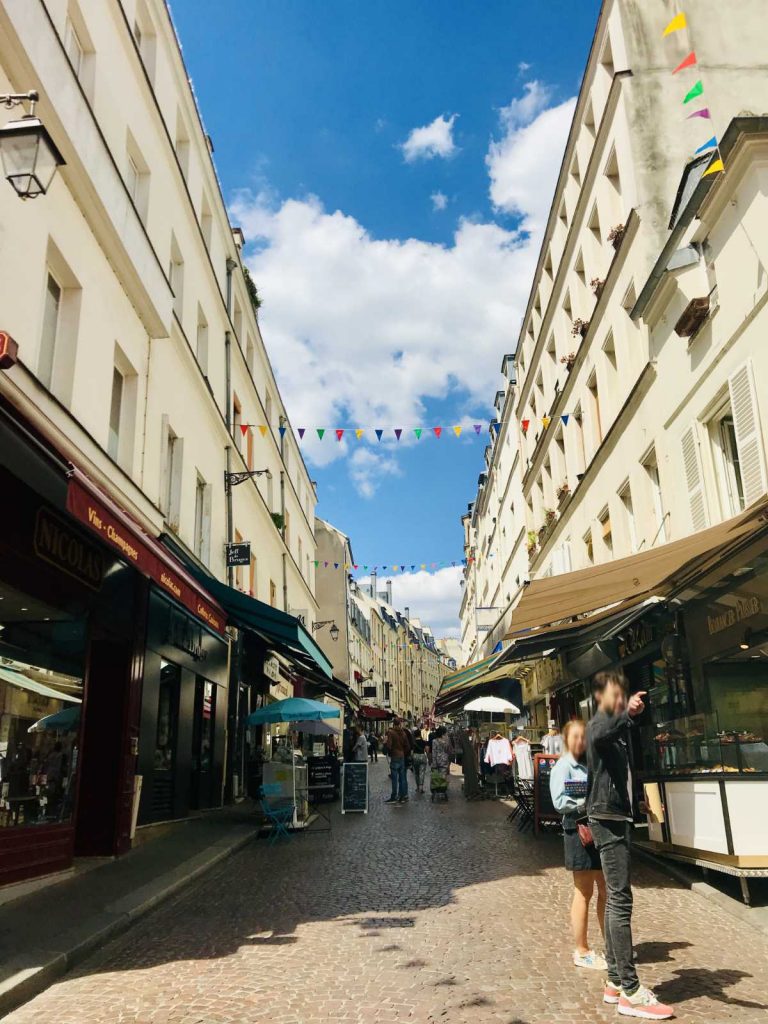
There is a bit of everything, from fruit and vegetable, cheeses, charcuterie, pâtés, seafood, pastries, cakes, and other sweets. If you are looking for organic products and souvenirs, you will easily find those here as well.
There are certain tips to visiting markets in France, such as not to touch the produce, and what to bring with you, which you can read here. Marché Mouffetard is open everyday except Mondays, from 8am to 1pm, while the shops on Rue Mouffetard are open everyday.
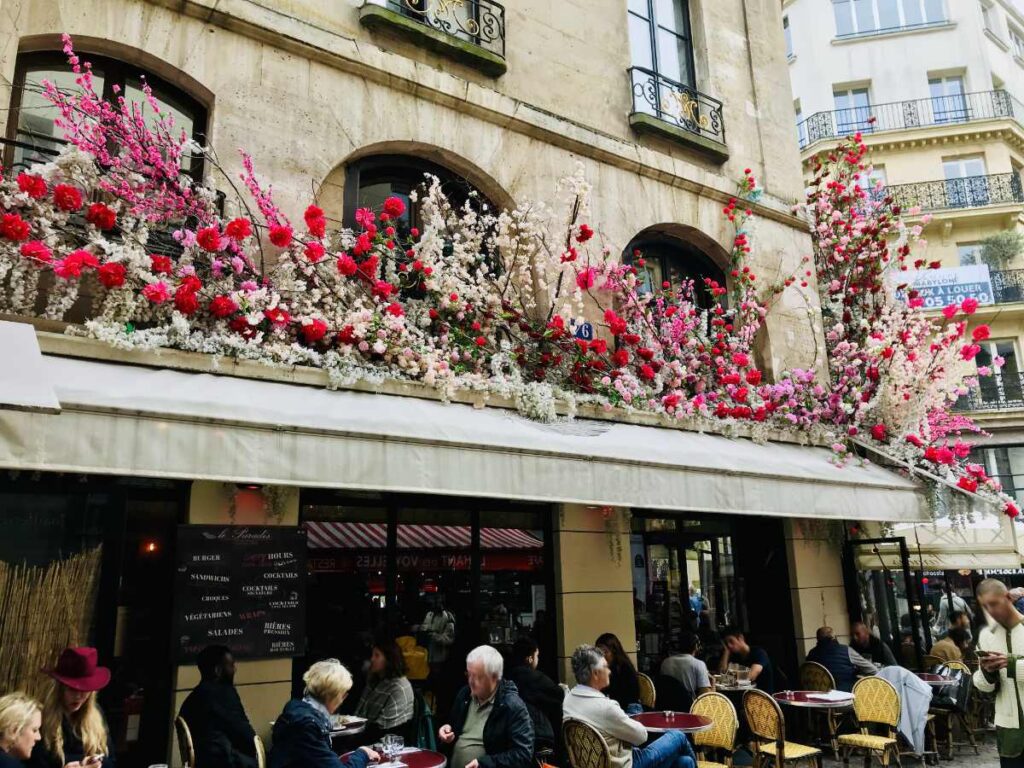
What to eat: Restaurants, Brasseries, and Bistros
Place Contrescape has several restaurants with terrasses where you can begin your night with an apéro, and then move on from there. Some local favorites in around the 5th are:
- Les Papilles – traditional French fare at 30 Rue Gay-Lussac, 75005 Paris
- Alliance – creative twist on French dishes at 5 Rue de Poissy, 75005 Paris
- Hebe – seasonal dishes at 15 Rue Frédéric Sauton, 75005 Paris
You can find more ideas and ways of spending an evening in Paris here.
Bars and Nightlife
With several universities in the 5th arrondissement like La Sorbonne and Jussieu, there are several student pubs and bars on Rue Mouffetard and around.
However, given that the 5th arrondissement is quite an expensive area in Paris, there are several bars and restaurants for “grownups” as well.
- Le 1802 du Monte Cristo (upscale rhum bar in Hotel Monte Cristo) – 22 Rue Pascal, 75005 Paris
- Le Piano Vache (a cheap rock bar) – 8 Rue Laplace, 75005 Paris
- Le Violin Dingue (cheap student bar) – 46 Rue de la Montagne Sainte Geneviève, 75005 Paris
- Pub Saint Hilaire (classic pub) – 2 rue Valette, 75005 Paris
You can find more bars and nightlife options around Paris here.
Where to stay: Hotels and other accommodation
A lively area with all the charm of historical Paris, you cannot go wrong staying in the 5eme arrondissement. There are no 5-star hotels in the 5th, but some other recommended hotels in the area are:
- €€€ – Hotel De Suez
- €€€ – Hotel du College de France
- €€€€ – Hotel Le Notre Dame Saint Michel
- €€€€ – Residence Henri IV
You can find more accommodation options for the 5th arrondissement here.

If you enjoyed that article, you may like to read more about the nearby 6th, 13th, and 14th arrondissements. A bientôt!
